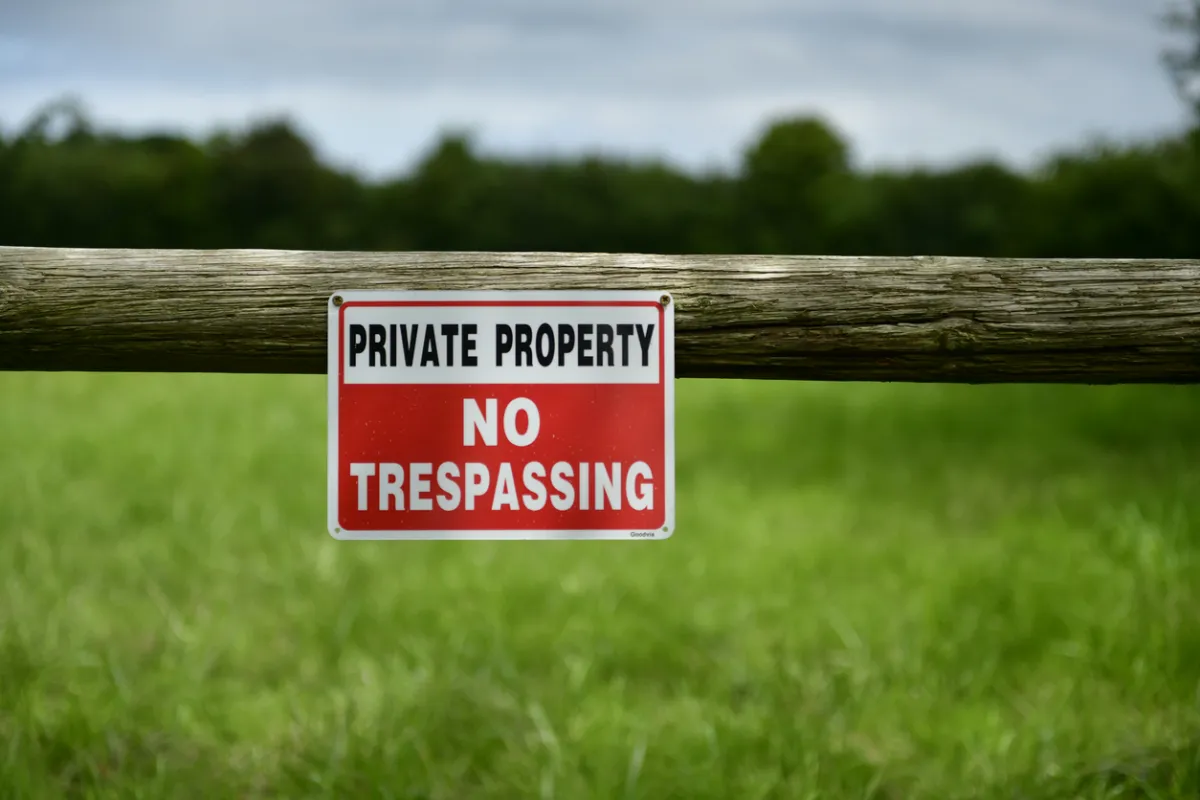Owning property in Virginia comes with certain rights, the primary one being the right to decide who can come onto your property. In other words, as a property owner, you can prevent others from making unauthorized entry. Anyone who ignores this right can be charged with the misdemeanor crime of criminal trespass.
A criminal trespassing charge in Virginia has several defining elements, which are meant to prevent someone who accidentally wanders onto private property from facing criminal charges and penalties. These penalties can include fines, jail time, and other collateral consequences.
Virginia trespassing laws are specific about what constitutes trespassing in Virginia. State laws are also clear about how criminal trespass differs from other crimes, such as burglary. If you’ve been hit with a trespass charge, it’s crucial to remember that there may be valid legal defenses a criminal defense lawyer can help you present.
What Counts as Criminal Trespass in Virginia?
The legal definition of criminal trespass in Virginia requires more than proof that someone was present on private land without permission. When does trespassing become a crime in Virginia?
While there are several types of trespassing charges, each type includes certain common elements, including that the person charged:
- Was present in a specific location
- Didn’t have authority or written consent to be in that place
- Was present for some illegal purpose
- Had been notified not to enter or remain on the property
While criminal trespassing is usually associated with private property, it’s also possible to commit criminal trespass on certain property open to the public, including schools, churches, and businesses.
The Role of Notice in Trespass Cases
Importantly, you can’t be found guilty of criminal trespass if you didn’t have prior notice that you were to stay off the property.
Trespassing without warning in Virginia isn’t a criminal offense. This requirement protects individuals who had no intention to violate a property owner’s rights from being charged with a crime for an accidental incursion.
Ignoring Notice Creates Criminal Liability
To get a conviction for criminal trespassing in Virginia, the prosecution must prove that the defendant had a criminal intent to violate the law. The way prosecutors prove criminal intent in most cases is to show that the person charged had been previously told not to go or remain somewhere but did so anyway.
For example, suppose that you walk through an open field, and there are no people or signs around alerting you to the fact that the field is private property. In this situation, you might legitimately believe that the field is open to the public and that you have a right to be there.
Now imagine that someone met you on the field and told you they were the owner and that you had to leave, or you spotted a “No Trespassing” sign on a large tree or fencepost just before you stepped onto the property. In this case, you would have no reason to believe that your presence was lawful.
In the second example, you would be violating Virginia’s trespassing laws since you demonstrated criminal intent by receiving notice and proceeding to trespass on the property.
What Counts as Notice Under Virginia’s Trespassing Laws?
Notice can take several forms, including posted signs, verbal warnings, or other communications. Regardless of the form it takes, though, it must clearly state that you aren’t allowed to be on the property or that you must immediately leave such land.
Examples of adequate notice include:
- A property owner verbally telling you to leave their land
- An agent of the owner, such as a store manager, giving you a written notice informing you that you’re banned from the premises
- Law enforcement officers verbally commanding you to stay off another party’s property
- A court ordering you not to be on or about a certain place
It’s also considered sufficient notice if the owner posts one or more “No Trespassing” signs on their property. Signage posted in an easily noticeable place can be enough to satisfy the notice requirement, even if the person doesn’t actually see it. All that’s necessary is that the sign is somewhere that a reasonable person could have seen it.
Key Virginia Laws Governing Trespass
The primary laws surrounding trespassing on someone else’s property in Virginia are found in Title 18.2, Article 5 of the Code of Virginia, which specifies the different kinds of trespass on another person’s property and the legal consequences of violating the rules pertaining to such lands.
Types of Trespass Charges
One question many people have is, “Can you be arrested for trespassing in Virginia?” The answer is yes. Criminal trespassing in Virginia is generally a class 1 misdemeanor, no matter the circumstances under which it occurs. This classification allows a police officer to arrest you if they have probable cause to believe you’re trespassing.
Some of the most common types of criminal trespass include:
- Trespassing after being forbidden
- Trespassing with the intent to damage property
- Trespassing on school or church property
- Trespassing in a cemetery or blocking a cemetery entrance
- Trespassing on a public train or failing to pay train fare
Each of these types of trespassing is a class 1 misdemeanor, except for trespassing on a public train, which is a class 4 misdemeanor. However, there are a few limited situations where criminal trespass becomes a felony.
Misdemeanor vs. Felony Trespass
A felony is a more serious crime than a misdemeanor and carries more severe penalties. Trespassing becomes a felony when it takes place under any of the following circumstances:
Hate Crime
A person who trespasses against another commits a class 6 felony when such person is targeted because of their race, ethnicity, national origin, color, or religion. In this case, the criminal trespass is considered a hate crime and is therefore deserving of harsher consequences.
Abducting a Child
Someone who trespasses on school property ordinarily commits a class 1 misdemeanor. However, if the individual enters school property (including a school bus) with the intention of abducting or kidnapping someone’s child, the offense is elevated to a class 6 felony.
To obtain a conviction for a class 6 felony, prosecutors must prove that the defendant intended to unlawfully enter or remain on another’s property. They must also show that the individual did so for the purpose of committing a hate crime or abducting a child, if appropriate.
Penalties and Aggravating Factors
The applicable misdemeanor trespass penalties in Virginia depend on whether the offense is a class 1 or class 4 misdemeanor.
Class 1 misdemeanors are punishable by a jail sentence of up to 12 months and $2,500 in fines. Class 4 misdemeanors are the least severe type of misdemeanor in Virginia and can result in financial penalties of up to $250. The court has the discretion to set a lower jail sentence or fine if it deems it appropriate.
Felony trespass penalties in VA include a prison sentence of between one and five years and a fine of up to $2,500, which can significantly affect your future after a trespass conviction.
Within these boundaries, the actual penalties for criminal trespass in Virginia that you might face depend on whether any aggravating factors were present. Aggravating factors can include:
- Whether this is your first offense trespass in Virginia or a second or third violation
- Any harm, injury, or loss sustained by the property owner
- Your motivation in committing the trespass
- The deliberateness of your actions
- Whether you had a reasonable but erroneous belief that you were acting lawfully
In addition to incarceration and fines, the penalties for a conviction of criminal trespassing in Virginia can include a term of probation, restitution for any damage caused, court costs and fees, and being prohibited from being on or near the property in question. In some cases, the property owner may also attempt to collect a civil penalty.
Furthermore, you’ll have a criminal record, which could impact any plans you have regarding your career, housing, and education. Having a misdemeanor conviction on your record can create headaches when applying for certain jobs or seeking to obtain certain professional licenses.
Exceptions and Special Situations
There’s a difference between trespass and burglary in Virginia. The crime of burglary requires someone to gain unlawful entry into a dwelling, house, structure, or other property with the intent to commit a felony.
There are also other situations that aren’t considered criminal trespass under Virginia’s trespassing laws. For instance:
- A landlord can’t accuse a tenant of criminal trespass without first going through the eviction process
- A land owner can’t trespass on the property they own, although they may be subject to penalties under landlord-tenant laws
- It’s illegal to block church or school property in order to keep a person lawfully permitted to be present from accessing that area
Another exception to Virginia’s trespassing laws is if you had written consent to be present on the property.
A right-of-way or easement is a legal instrument creating a right for a designated party to access a given property for some recognized purpose or interest. For example, you could have such interest for accessing your own property from a public road or running utilities to your home.
Common Defenses to Trespassing Allegations
One of the most common and effective defenses to trespassing allegations is that you didn’t receive notice or have reason to believe that you were trespassing.
You can’t be convicted of trespassing without warning in Virginia — that is, being found guilty of trespassing when you didn’t receive proper notice. The prosecution must show that you received notice that you weren’t allowed to be on the property in question.
Another common defense raised in trespassing cases is that the accused had a legal right or permission to be present where they were alleged to be.
You can’t trespass on your own property. Neither can you be convicted of criminal trespass under Virginia property trespass laws if someone with superseding authority allowed you to enter or remain on the property.
For example, suppose that your neighbor told you you could come onto their property and borrow tools from their shed as you need them; however, their spouse claims you weren’t invited.
In this situation, you likely couldn’t be convicted of trespassing under Virginia law if you went into your neighbor’s shed to borrow a tool. That’s because someone with authority and ownership over the property (your neighbor) gave you legal permission to be there.
However, the situation would be different if a store manager had explicitly forbidden you from returning to their store, but a cashier told you otherwise.
In this case, the cashier doesn’t have the authority to permit or prohibit people from entering the store. If you were to act on the cashier’s permission, you would likely be arrested and charged with criminal trespassing.
Charged With Trespassing in Virginia? Why a Proactive Legal Defense Matters
In any criminal proceeding, the prosecution bears the legal burden of proving the accused is guilty beyond a reasonable doubt.
Legally speaking, you don’t have to present any evidence in your defense or prove your innocence. However, adopting a defense strategy in which you simply hope a judge or jury doesn’t find the prosecutor’s case satisfactory is unnecessarily risky.
When you retain a lawyer, they’ll request all police reports, witness statements, photographs, videos, and other evidence the prosecutor intends to use against you. From there, your criminal defense lawyer will take the following steps:
- Seek to undermine the credibility of your accuser and the witnesses who testify against you
- Expose weaknesses in the prosecution’s case, such as blurry images or inconclusive video footage
- Examine the scene itself to see if signage was present and where it was placed
- Find witnesses to counter or challenge the prosecution’s narrative
- Gather exculpatory or alibi evidence that might exonerate you
- Explore various legal defenses for trespass charge in Virginia
Your legal team can also explore ways to resolve your criminal case without having a trespassing conviction on your record.
For example, you may be eligible for a pretrial diversion program that could result in the conviction being expunged from your record. Alternatively, your lawyer might try to reach a plea agreement with the prosecution that would lessen the severity of your charges or the penalties you face.
Finally, your attorney can explain your legal rights, your options for approaching your case, and the risks and benefits of those choices. They’ll have the experience and resources necessary to act on your informed decisions. In short, an attorney’s assistance can make all the difference in the outcome of your trespassing case.
Contact Scott C. Nolan Today for Help With Your Trespassing Charges
Dismissing criminal trespassing charges in Virginia as a small matter can be a big mistake.
Even simple acts like entering property marked private or returning to a store when you’ve been told to stay away can be considered trespassing or unlawfully remaining. These offenses can lead to a class 1 misdemeanor conviction that upends your life and damages your reputation.
Defending against trespassing charges on your own can be challenging, and you can’t rely on the judge or prosecutors to look after your interests. You need someone on your side who is willing to fight for you, especially if you’re facing more serious charges like trespass with disorderly conduct.
Attorney Scott C. Nolan is ready to put his considerable experience to work for you inside and outside of court. When you place your trust in our firm, we’ll honor that trust by diligently investigating your case, presenting you with options for resolving your charges, and working hard to pursue your chosen course of action swiftly.
When the police or prosecution overstep their boundaries and go beyond reasonable expectations, we’ll be there to stand up for your rights and good name.
If you’ve been arrested or cited for criminal trespass in Virginia, contact the law offices of Scott C. Nolan today to begin mounting a viable defense.



